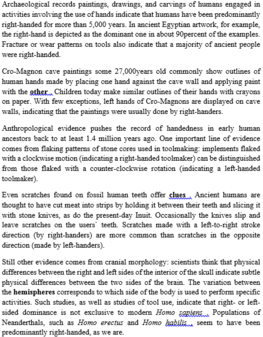*Read the following passage and mark the letter A, B, C or D on your answer sheet to indicate the correct answer to each of the question.
School education system in England
Schooling is compulsory for all English children from the age of 5 to 16. The academic year in England runs from September to July and is divided into three terms. Autumn Term is from the beginning of September to mid – December. Spring Term is from the beginning of January to mid- March and Summer Term from early April to mid – July. Each term is separated by a one-week break called half terms, usually at the end of October, mid- February and the end of May.
There are two parallel school systems in England. The first is the state school system, which is free for all students and paid for by the state. The second category is the “independent” or “public school system, which is fee-paying. The state school system, which educates 93% of the pupils in England, can be divided into two levels of education: primary education and secondary education.
The National Curriculum is set by the government and must be followed in all state schools. It is made up of the following subjects : English, Design and Technology , Geography, Maths, Information Technology , Music , Science , Arts , Physical Education , History and a Modern Foreign Language. English, Maths and Science are core subjects, which are compulsory in the national examination at certain stages of the school education system.
Question 8: When do children in England start their compulsory schooling?
A. When they are from 5 to 16 years old. B. When they are under 5 years old.
C. When they are 16 years old. D. When they are 5 years old.
Question 9: When do students in England take their half terms?
A. At the end of the school year B. At the end of each term
C. In the middle of each term D. At the beginning of each term
Question 10: The phrase is made up of in the passage means………………
A. exclude B. be compulsory
C. include D. produce
Question 11: Which of these statements is NOT true about the school education system in England?
A. The students who go to state school do not have to pay tuition fees.
B. Most students in England go to state school.
C. There are three half terms in a school year, which last one week each.
D. The National Curriculum is set by the government and must be followed in all schools.
Question 12: What does the word it in paragraph 3 refer to?
A. Primary education B. The government
C. The state school system D. The national curriculum


Đáp án: D
Giải thích: Ở đoạn 4, tác giả nêu ra 3 điều kiện để tiếng lóng được tạo ra, trong đó không có điều kiện nêu ở câu 4 là một số lượng lớn nhà ngôn ngữ học.